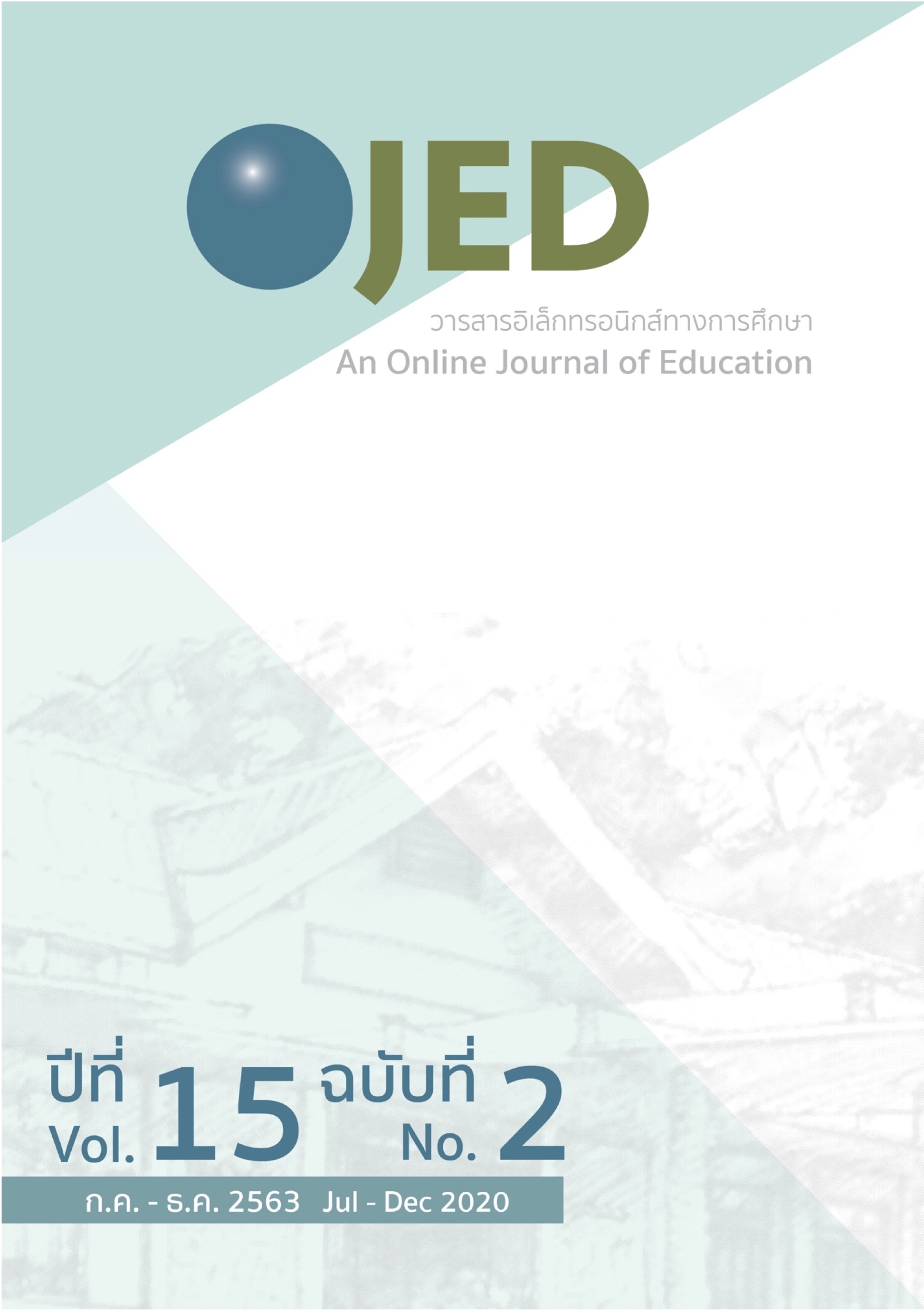Effects of Argumentation and Evaluation Instruction on Scientific Reasoning Ability and Biology Learning Achievement of Upper Secondary School Students
DOI:
https://doi.org/10.14456/ojed.2020.32Keywords:
argumentation and evaluation instruction, scientific reasoning ability, biology learning achievementAbstract
This study was a quasi-experimental research. The purposes of this study were to 1) compare scientific reasoning ability of upper secondary school students between before and after learning through argumentation and evaluation instruction 2) compare scientific reasoning ability of upper secondary school students between an experimental group that learned through argumentation and evaluation instruction and a control group that learned through a conventional teaching instruction 3) study biology learning achievement of upper secondary school students who learned through argumentation and evaluation instruction, and 4) compare the biology learning achievement of upper secondary school students between an experimental group that learned through argumentation and evaluation instruction and a control group that learned through a conventional teaching instruction. The samples were two classes of eleventh grade students in a Mathematics-Science program of a large-sized school under the Office of the Basic Education Commission of Thailand who studied during the first semester of the 2016 academic year. The research instruments were a scientific reasoning test and a biology learning achievement test. The collected data were analyzed by arithmetic mean, mean of percentage, standard deviation and t-test
The research findings are summarized as follows : 1) The experimental group had a scientific reasoning ability mean score of 2.41 from a full score of 6, making the score higher than before the experiment and higher than control group at a .05 level of significance. 2) The experimental group had a biology learning achievement mean score of 18.72 from full score of 30, or 62.4 percent, which was lower than the criterion score, set at 70 percent, and higher than that of the control group at a .05 level of significance.
References
กิ่งฟ้า สินธุวงษ์. (2547). ปิอาเจท์: การเรียนรู้กับการพัฒนาผู้เรียน. มหาวิทยาลัยขอนแก่น.
พิมพันธ์ เดชะคุปต์ และ พเยาว์ ยินดีสุข. (2548). การเรียนการสอนที่เน้นผู้เรียนเป็นศูนย์กลาง. เดอะมาสเตอร์กรุ๊ป แบเนจเมนท์.
วรัญญา จำปามูล. (2555). ผลของการใช้รูปแบบการเรียนการสอนการสร้างข้อโต้แย้งที่มีต่อผลสัมฤทธิ์ทางการเรียนรู้วิทยาศาสตร์และความสามารถในการคิดเชิงเหตุผลของนักเรียนมัธยมศึกษาตอนต้น. [วิทยานิพนธ์ปริญญามหาบัณฑิต]. Chulalongkorn University Intellectual Repository (CUIR). https://cuir.car.chula.ac.th/handle/123456789/42263
สถาบันทดสอบทางการศึกษาแห่งชาติ. (2559ก). รายงานประจำปี 2559. https://www.niets.or.th/uploads/content_pdf/pdf_1503649895.pdf
สถาบันทดสอบทางการศึกษาแห่งชาติ. (2559ข). สรุปผลการทดสอบทางการศึกษาระดับชาติขั้นพื้นฐาน (O-NET) ชั้นมัธยมศึกษาปีที่ 6 ปีการศึกษา 2558. http://www.newonetresult.niets.or.th/ AnnouncementWeb/PDF/SummaryONETM3_2558.pdf
สถาบันส่งเสริมการสอนวิทยาศาสตร์และเทคโนโลยี. (2554). ผลการประเมิน PISA 2009 การอ่านคณิตศาสตร์ และวิทยาศาสตร์. อรุณการพิมพ์.
สถาบันส่งเสริมการสอนวิทยาศาสตร์และเทคโนโลยี. (2557). รายงานผลการวิจัยโครงการ TIMSS 2011 วิชาวิทยาศาสตร์. https://drive.google.com/file/d/0BwqFSkq5b7zSSEZCOFdkZzZIUGM/view
Acar, Ö. (2014). Scientific reasoning, conceptual knowledge, & achievement differences between prospective science teachers having a consistent misconception and those having a scientific conception in an argumentation-based guided inquiry course. Learning and Individual Differences, 30, 148-154. https://doi.org/10.1016/j.lindif.2013.12.002
Balci, C., & Yenice, N. (2016). Effects of the scientific argumentation based learning process on teaching the unit of cell division and inheritance to eighth grade students. Journal of Education in Science, Environment and Health (JESEH), 2(1), 67-84. https://files.eric.ed.gov/fulltext/ED564043.pdf
Bulgren, J. A., Ellis, J. D., & Marquis. J. G. (2014). The use and effecitveness of an argumentation and evaluation intervention in science classes. Journal of Science Education and Technology, 23, 82-97. https://doi.org/10.1007/s10956-013-9452-x
Cross, D., Taasoobshirazi, G., Hendricks, S., & Hickey, D. T. (2008). Argumentation: A strategy for improving achievement and revealing scientific identities. International Journal of Science Education. 30(6), 837-861. https://doi.org/10.1080/09500690701411567
Hazen, R. (2015). Why should you be scientifically literate. http://serc.carleton.edu/sp/process_of_science/examples/sci_literate.html
Herr, N. (2008). The sourcebook for teaching science, grades 6-12: Strategies, activities, and instructional resources. Jossey-Bass.
iSTAR Assessment. (2013). Hypothetical-deductive reasoning. http://www.istarassessment.org/srdims/hypothetical-deductive-reasoning-needs-pictures/
Lau, J. & Chan, J. (2015). Scientific methodology. http://philosophy.hku.hk/think/sci/
Lajoie, S. P., Greer, J. E., Munsie, S., Wilkie, T., Guerrera, C., & Aleong, P. (1995, December 5-8). Establishing an argumentation environment to foster scientific reasoning with bio-world. In International Conference on Computers in Education, Singapore. https://www.researchgate.net/publication/2426481_Establishing_an_Argumentation_Environment_to_Foster_Scientific_Reasoning_With_Bio-World
Laugksch, R. C. (2000). Scientific literacy: A conceptual overview. Science Education, 84(1), 71-94.
Lawson, A. E. (1978). The development and validation of a classroom test of formal reasoning. Journal of Research in Science Teaching, 15(1), 11-24.
Lawson, A. E. (1985). A review of research on formal reasoning and science teaching. Journal of research in science teaching, 22(7), 569-617. https://doi.org/10.1002/tea.3660220702
Lawson, A. E. (2000). Classroom test of scientific reasoning. Journal of Research in Science Teaching, 15(1), 11-24.
Lawson, A. E., Drake, N., Johnson, J., Kwon, Y. J., & Scarpone, C. (2000). How good are students at testing alternative explanations of unseen entities?. The American Biology Teacher, 62(4), 249-255. https://doi.org/10.2307/4450890.
Moore, J. C. (2012). Transitional to formal operational: using authentic research Experiences to get non-science students to think more like scientists. European Journal of Physics Education, 3(4), 1-12. https://eric.ed.gov/?id=EJ1052000
Odabasoglu, F., Yildirim, O. S., Aygun, H., Halici, Z., Halici, M., Erdogan, F., Cadirci, E., Cakir, A.,
Okumus, Z., Aksakal, B., Aslan, A., Unal, D., & Bayir, Y. (2012). Diffractaic acid, a novel proapoptotic agent, induces with olive oil both apoptosis and antioxidative systems in Ti-implanted rabbits. European Journal of Pharmacology, 674(2-3), 171-178. https://doi.org/10.1016/j.ejphar.2011.11.019
Organization for Economic Cooperation and Development. (2009). PISA 2009 Assessing framework: Key competencies in reading mathematical and science. http://www. oecd.org/document/44/0,3343,en_2649_35845621 _44455276_1_1_1_1,00.html.pdf
Programme for International Student Assessment, (2015), Draft science framework. http://www.oecd.org/pisa/pisaproducts/Draft%20PISA%202015%20Science%20Framework%20.pdf
Schen, M.S. (2007). Scientific reasoning skills development in the introductory biology courses for undergraduates [Doctoral dissertation, Ohio State University]. OhioLINK Elctronic Theses & Dissertations Center. https://etd.ohiolink.edu/!etd.send_file?accession=osu1187063957&disposition=inline
Tajudin, N. M., & Chinnappan, M. (2015). Exploring relationship between scientific reasoning skills and mathematics problem solving. https://files.eric.ed.gov/fulltext/ED572516.pdf
Thomson, S., Hillman, K., & Bortoli, L. D. (2013). A teacher’s guide to PISA scienctific literacy. https://www.acer.edu.au/files/PISA_Thematic_Report_-_Science_-_web.pdf
Downloads
Published
How to Cite
Issue
Section
License

This work is licensed under a Creative Commons Attribution-NonCommercial-NoDerivatives 4.0 International License.




